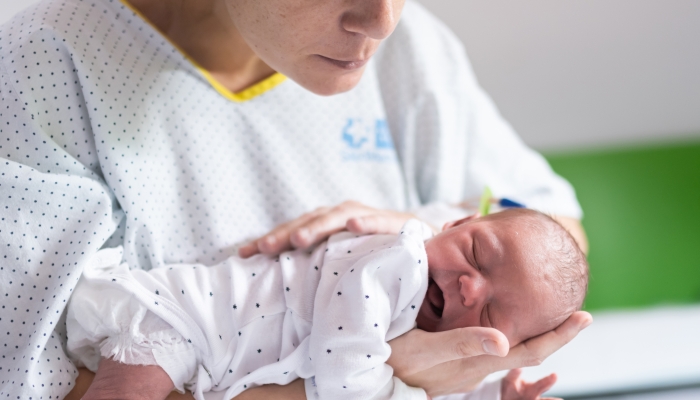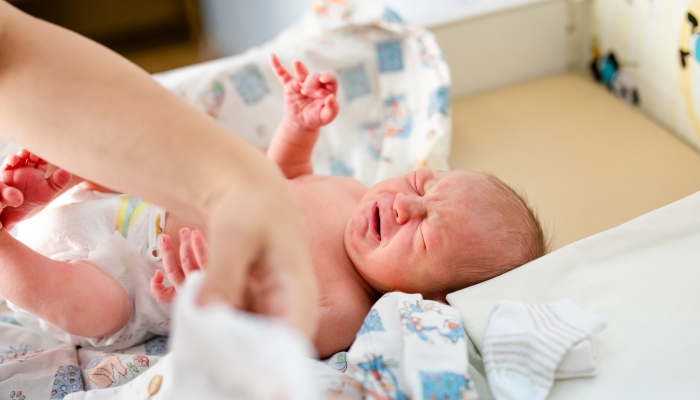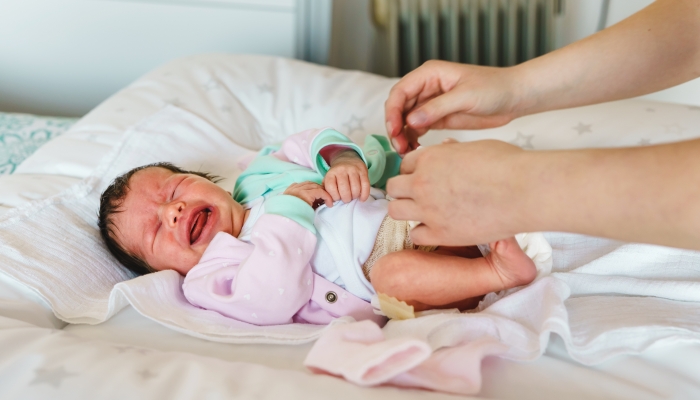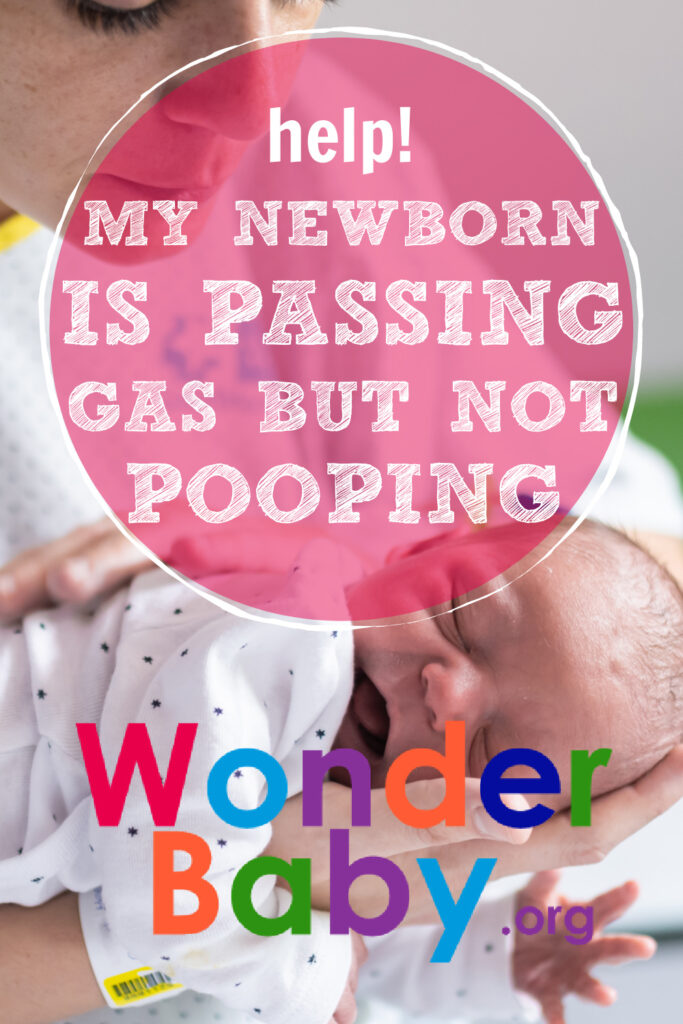Help! My Newborn Is Passing Gas but Not Pooping

- Newborns should have a bowel movement at least every four days.
- See your baby’s doctor if your baby’s belly feels firm or your baby’s poop frequency changes dramatically.
- Exclusively breastfed babies tend to have more frequent bowel movements than formula fed babies.
- If your baby is not pooping but passing gas, you can try a warm bath or different kinds of fruit juice to help them have a bowel movement.
While it’s not everyone’s favorite topic, monitoring your baby’s bowel movements and how often they are passing gas are important parts of keeping track of their health. Just like adults, babies can suffer from both diarrhea and constipation. Unfortunately, babies don’t have a great way to tell their parents when they’re having tummy troubles.
When your baby seems extra fussy, the most likely reasons are that they are tired, hungry, or gassy. Tracking your child’s sleep, eating, and pooping habits can give you clues about what might be causing your baby’s fussiness. You may notice that your baby has not had a bowel movement in a few days but is passing gas.
Parents who notice their baby having digestive problems often ask for help because their newborn is passing gas but not pooping. Fortunately, there are some things you can try to help them have a bowel movement.
How Often Should Newborns Poop?
Babies’ poop does not always come right on schedule, and every baby’s digestive system is different. A newborn baby may have healthy bowel movements several times a day or just one every few days.
According to the Children’s Hospital of Colorado, your baby should have a bowel movement at least once every four days. Breastfed babies usually have more frequent bowel movements than formula fed babies. It is completely normal for some breastfed babies to poop every time they breastfeed.
Normal Baby Poop
A brand new baby will pass very dark and tarry stool called meconium. After a few days, this will change to more of a normal infant stool.
Normal baby poop should be soft but not liquid. Baby poop should be no more firm than peanut butter consistency. Stools that are hard or shaped like pebbles indicate constipation. Liquid diarrhea or frequent diaper blowouts may indicate a stomach virus or foodborne illness.
According to the Mayo Clinic, baby poop can range in color and might be green, yellow, or tan. Usually, breastfed babies have more greenish poop, and formula-fed babies have tan poop.

Newborn Not Pooping but Passing Gas: Is It Normal?
If you notice your newborn not pooping but passing gas, they may be struggling with constipation. However, some babies are just more gassy than others.
As your baby’s digestive system develops, it can be normal for them to pass a lot of gas. As long as your baby seems comfortable, is passing stools easily, and their poop is a normal color and consistency, you shouldn’t need to worry.
What Can Cause a Newborn To Pass Gas but Not Poop?
Since new babies’ digestive systems are still developing, there are many reasons they might have a lot of gas. Texas Children’s Hospital explains some of the reasons for infant gassiness:
- Swallowing Air. Bottle fed and breastfed babies may swallow air when they are eating if they eat too quickly, don’t get a good seal around the bottle nipple, or have a poor breastfeeding latch.
- Cow’s Milk Allergy. While allergies to cow’s milk are rare, breastfed babies with these allergies can become gassy if their mothers consume dairy products.
- Gut irritating foods. Some foods that a mother eats can be difficult for babies to digest. These foods may cause gas and discomfort in breastfed babies.
- Gastrointestinal Viruses. Gastrointestinal viruses are common in young children and usually resolve on their own. These viruses might cause vomiting, diarrhea, and excessive gas.
- Constipation. Babies who are constipated may pass more gas than usual. This gassiness is usually accompanied by fussiness, bloating, and straining during a bowel movement.
What To Do if Your Newborn Is Passing Gas but Not Pooping
If your baby is comfortable, it’s okay to wait a day or two to see if they have a normal bowel movement. If they are fussy or are straining to pass gas, you can try a few at-home remedies for constipation.
Fruit Juice
Fruit juice is often recommended for babies with constipation or hard stools. Apple juice and pear juice can be given to babies over one month of age. Prune juice can be given to babies ages 3 months and older.
Always use 100% juice with no added sweeteners, and only use a small amount at a time. The Mayo Clinic recommends starting with just 2 to 4 ounces each day.
Corn Syrup
Corn syrup has long been used to help babies with constipation. A 2005 study showed that corn syrup may be effective for treating constipation in 25% of children. However, there is some risk of bacteria growing in corn syrup that can be dangerous for young babies.
Warm Bath
Giving your baby a warm, relaxing bath may help them with stomach pains and constipation. The warm water can help your babys’ abdominal muscles relax and can soothe pain caused by stomach problems.
Bicycle Legs
Using baby massage or adjusting their position can help make stool easier to pass. Babies commonly grunt or strain when they pass a bowel movement, not because their stools are hard, but because pooping while laying down is difficult.
You can help your baby by gently holding their legs and moving them in circles, similar to the way your legs move when riding a bicycle.
Use Special Bottles
If your baby seems to swallow a lot of air while eating, you can use a special bottle or slow-flow nipple to help them. These special bottles can help prevent gas, bloating, and discomfort.
Burp Frequently During Feedings
Burping your baby after each feeding helps break up little gas bubbles and make them easier to pass. Babies with sensitive stomachs, who eat quickly, or who are experiencing excessive gas may need to be burped more frequently.
Encourage Hydration
As your baby starts to eat solid foods, they may become constipated as their digestive system gets used to the new foods. Make sure that your baby is drinking enough while eating solid foods.

When To Call Your Pediatrician
Baby constipation usually clears up on its own, but there are a few signs that indicate you may need to take your constipated baby to the doctor immediately:
1. No stool for longer than four days.
While most infants do not need to have a bowel movement every day, going longer than four days between bowel movements is cause for concern. If your baby usually has several bowel movements each day, and the pattern changes suddenly, you may want to call your child’s doctor.
2. Bloated or firm abdomen.
It is normal and healthy for babies to have bellies that stick out a little. However, if your baby suddenly becomes more bloated than usual, they may be having stomach problems.
Babies’ bellies should also be soft when you touch them. Firmness in the belly is a sign of constipation and should be addressed by your pediatrician.
3. Blood in stool.
If you notice blood in your child’s stool, you should take them to see a doctor as soon as possible. Bright red blood may be a sign of a lower gastrointestinal bleed or trauma.
4. White or black colored stool.
While your baby will pass black, tarry meconium during their first day or two of life, black and tarry stool in older children is a concerning sign. Black stool in older infants and children may indicate upper gastrointestinal bleeding.
White or extremely light colored poop is rare but can indicate serious liver problems. If you notice that your baby has white or chalky stools, call your pediatrician.
5. Excessive crying or straining while passing gas.
While it’s normal for babies to grunt and strain a little while having a bowel movement, they should not be experiencing pain. Your baby might be constipated if they cry while trying to pass gas or stool.
FAQs
What does a healthy newborn poop look like?
Healthy newborn poop should be green or tan, and should be a soft consistency. Baby poop should not be hard or pellet-like, and you should call your pediatrician if you see red, black, or white stool.
Does starting solids make babies constipated?
When your baby starts to eat solid food, it may take their stomachs a little while to adjust. They may be more gassy or more constipated than usual. Most children adjust to the addition of solid foods without problems. Be sure to add solids slowly, and talk to your child’s pediatrician if you have any concerns.
Can I give my baby miralax?
If your baby is constipated, you may be tempted to add a laxative to your baby’s formula. Adding medications like miralax to formula milk or breast milk is dangerous and could harm your baby. Talk to your baby’s pediatrician if you feel like they need medication.

The information WonderBaby provides is not intended to be, and does not constitute, medical or other health advice or diagnosis and should not be used as such. Always consult with a qualified medical professional about your specific circumstances.
Related Posts

Eye Conditions and Syndromes, Visual Impairment
Neuralink Announces Plans to Restore Sight to the Blind with Brain Chip
Elon Musk’s company Neuralink has announced plans to begin human trials of its new “Blindsight” brain chip by the end of 2025.

Health & Nutrition
Can Baby Skin Care Products Expire?
Is that forgotten tube of diaper rash cream still safe to use? Learn more about the expiration dates of popular skin care products for infants.

Health & Nutrition
Boosting Immunity in Kids: 3 Tips for a Healthy Winter
Parents can help boost their kids’ immunity during cold and flu season by maintaining healthy eating, sleeping, and exercising habits in the winter.